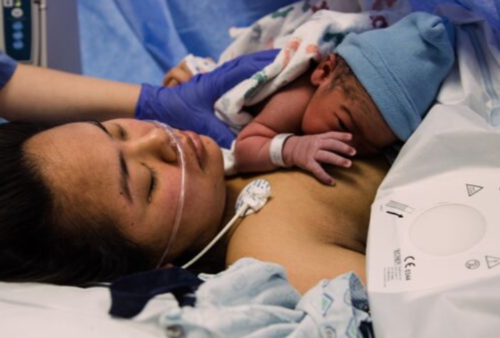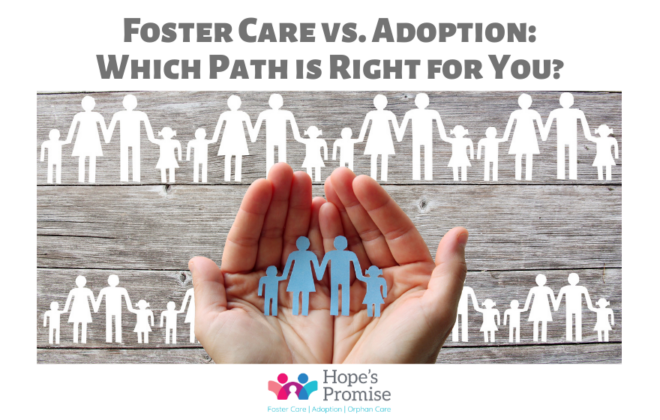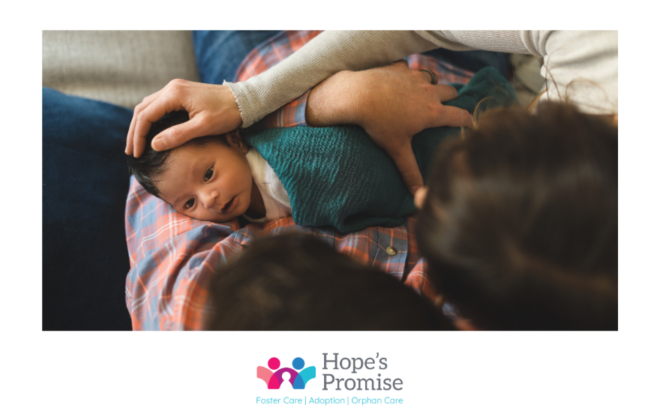Becoming Omma
By Emily Thornton – posted on The Adopted Life
I was 30 years old when I met my first biological relative. The moment he appeared he wailed an overwhelming loud and shrill cry. After 24 hours of natural labor, an epidural and then an emergency cesarean, my body was exhausted and reacting to all of the medications. My mind was racing with impatience because it felt too surreal that I would soon feel his little body next to mine. I looked over at my husband who had a better view of Zephaniah on the other side of the thin blue, surgical curtain. In a barely audible whisper, I asked “Is this real? He’s here?” He said “Yes. This is our baby. He has your blood.” I longed to hear that statement, but needed to see him up close to truly believe it.

When he was placed on my chest tears dropped from my eyes. His fingers were long, his black hair was thick, his lips were full and pouty. My mind obtrusively wandered to my biological mom…Did my Omma’s heart swell with emotion immediately after she gave birth to me? When she saw me, did she notice my nose and cheek bones?
During the months leading up to Zephaniah’s arrival, my body was preparing for his entry in all of the ways it should. My doctor characterized my pregnancy as “normal.” However, the doctor didn’t know that my mind was at war with itself. At each milestone during my first trimester my husband and I grew increasingly eager for our growing family, however, my heart ached in a way that was difficult to explain. While becoming more and more aware of the deep connection and complete dependence this child had to me, I simultaneously became aware that my Omma must have been connected to me, too. I thought I had grieved the loss of my birthmother almost six years ago when I came to an inconclusive end in my search for her, but now as I was experiencing pregnancy for the first time the feelings were back and extremely intense. The thought of my Korean mother carrying me and ultimately handing me over directly after birth seared a note of sadness right next to the joy of my pregnancy. Just as I had less space in my petite frame as he grew in my belly, I had less space in my brain for these all-encompassing emotions.
I desired to focus on the way my body was changing on the daily, noting the constant cravings and tending to my morning sickness, however I was also tasked with weighing existential thoughts. How could she do it? How did she see and feel her growing belly each day and not cry her entire way through those 9 months? Maybe she did cry? What was the first night like for her after she had given birth and didn’t have me next to her? Does she hear my first cry in real life, her dreams, her nightmares? Why am I here? Why, a million times, why, is she gone?
As I consider how challenging my Omma’s life probably was at the time she gave birth to me, I grow very emotional. I try to imagine the shame and condemnation she likely endured from Korean culture that traditionally oppresses unwed mothers and their offspring. I, on the other hand, was granted so much support and encouragement as I labored with Zephaniah. It’s difficult to accept how opposite our experiences must have been.
While holding my three day old son in the wee hours of the night, I experienced my first genuine reprieve from the sadness that had accompanied my entire pregnancy. My son, so small and so vulnerable, allowed me to get a glimpse of my Omma. It was as if he had opened up a mirror in my soul and healed a small piece of the void. He was connecting us through time and space. It was at that very moment I realized I had become her. I had become my Omma.
————
*To learn more about Emily and her family, watch a documentary about her open adoption relationship with her son Neiko’s birthmother, HERE.




